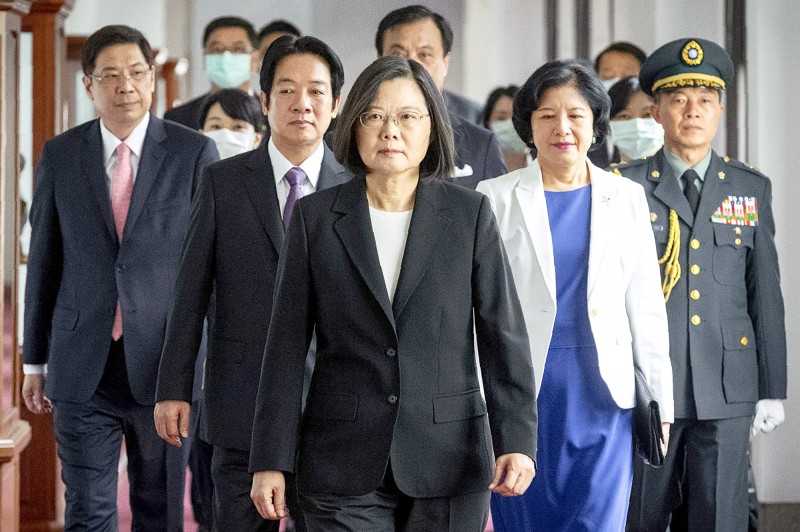《TAIPEI TIMES》Tsai promises to push peace, stability

President Tsai Ing-wen, center, walks ahead of Vice President William Lai, to her left, as they head toward their inauguration ceremony in Taipei yesterday. Photo: AP / Presidential Office
STANDING FIRM: In her inaugural address, the president said Taiwan would not accept Beijing’s use of the ‘one country, two systems’ formula to downgrade the nation
By Su Yung-yao / Staff reporter
President Tsai Ing-wen (蔡英文) in her inaugural address yesterday vowed to continue efforts to push for peace and stability in the Taiwan Strait, adding that the nation would not accept Beijing’s “one country, two systems” framework.
Tsai and Vice President William Lai (賴清德) were sworn in yesterday morning at the Presidential Office Building in Taipei.
Following the swearing-in ceremony, Tsai delivered her second inaugural address from a podium in front of the nearby Taipei Guest House.
Tsai spoke on four major topics: industrial development, social safety, national security and the strengthening of Taiwan’s democracy.
Highlighting the importance of optimizing government institutions, she said that the Legislative Yuan is to establish a constitutional amendment committee that would provide the nation with “a platform to engage in dialogue and reach a consensus on constitutional reforms pertaining to government systems and people’s rights.”
“This democratic process will enable the constitutional system to progress with the times and align with the values of Taiwanese society,” she said.
Calling it a bipartisan issue, she said that a proposal to lower the voting age in Taiwan from 20 to 18 should be prioritized.
Under the Constitution, only citizens older than 20 have the right to vote in elections.
Tsai said that despite a National Congress on Judicial Reform and making legislative amendments, which serve as “base work for the further improvement” of the judicial system, there is still a gap between what has been achieved in terms of judicial reform and what the public expects.
She promised to continue to listen to different opinions, saying that the public’s dissatisfaction is what drives reform.
A lay judge system needed to be implemented, to help bridge the gap between the people and the judicial system, Tsai said.
While emphasizing the need to “mend” the nation’s social safety net, Tsai said that she would improve the social care system and the work environments of front-line social workers so that they could “identify people who have fallen through” the net.
Regarding controversies triggered by specific cases, she said: “We cannot hold medical agencies or individual judges solely responsible,” and called on the judicial and executive branches of the government to re-evaluate their systems.
A digital development agency is to be created as part of the Executive Yuan’s organizational reform — a process which would include “adjustments to all ministries in line with current needs,” Tsai said.
The establishment of the Control Yuan’s National Human Rights Commission in August would mark a “milestone in our journey to place human rights at the center of Taiwan’s national ethos,” and the beginning of a “new chapter” for the Control Yuan, she added.
As for cross-strait relations, they have “reached a historical turning point,” Tsai said.
Taiwan and China each have a responsibility to “find a way to coexist,” and “prevent the intensification of antagonism and differences,” she said.
Over the past four years, Taiwan has “made the greatest effort to maintain peace and stability in the Taiwan Strait,” she said.
“We will continue these efforts, and we are willing to engage in dialogue with China and make more concrete contributions to regional security,” she said.
However, she added: “We will not accept the Beijing authorities’ use of ‘one country, two systems’ to downgrade Taiwan and undermine the cross-strait status quo.”
Tsai also called for active international participation, saying that Taiwan has been praised throughout the COVID-19 pandemic for its “selfless assistance to the international community.”
“Over the next four years, we will continue to fight for our participation in international organizations, strengthen mutually beneficial cooperation with our allies, and bolster ties with the United States, Japan, Europe and other like-minded countries,” she said.
新聞來源:TAIPEI TIMES

Guests invited to hear President Tsai Ing-wen’s inaugural address at the Taipei Guest House are seated apart in accordance with social distancing guidelines. Photo: CNA













